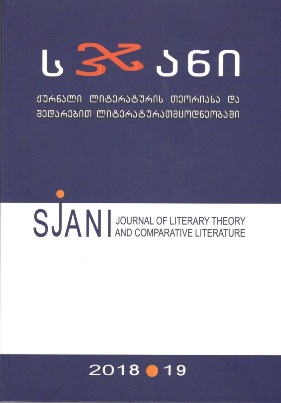parodiuli asocireba jeimz joisis moTxrobaSi
„madli“
Parody References in James Joyce’s “Grace”
Author(s): Temur KobakhidzeSubject(s): Language and Literature Studies
Published by: ლიტერატურის ინსტიტუტის გამომცემლობა
Keywords: “Grace”; Joyce; Dante; ironic, parody.
Summary/Abstract: Joyce’s ‘Grace’, which is famously based on the model from The Divine Comedy,also adopts the Book of Job as a framework for artistic expression. Intriguing parallelscan also be drawn between ‘Grace’ and St Augustine’s Confessions, ‘Grace’ and the Deedsof Apostles. Seemingly, ‘Grace’ is a tale that deals with alcoholism, but the real focus ofthe story is religion and its social function in the life of a society in the state of paralysis.The story is rife with allusions and symbols, referring to a variety of sources, primarilytheology and the history of the Catholic Church.However,by means of ironic association,the focus is skillfully shifted from theology to the reality of Joyce’s contemporary Dublin,and in the first place, the irony concerns the social life of Dubliners, their manners andtheirway of life.The action of the story is clearly limited by the three venues of a pub, Tom Kernan’shouse and the Church, where he is taken as a new convert, to reconfirm his unionwith the Church.The triadic structure of the story has a symbolic significance; besides TheDivine Comedy and The Book of Job, it also refers to the three-partstory of St Paul’s conversion(his sinful fall,a call from heaven andsalvation), thus transforming Tom KernanintoparodicSt Paul, as well as Job and Dante the character of the poem. Further associativeavatars of Kernan can be identified as Pope Pius IX and Pope Leo XIII, who respectivelysignifyalcoholism and epilepsy as the symbols of spiritual and physical decay. The Fallissymbolically implied in the beginning of the story, when Kernan falls down from the stairsin the lavatory, and starts his parodic spiritual journey...
Journal: სჯანი
- Issue Year: 2018
- Issue No: 19
- Page Range: 86-112
- Page Count: 27
- Language: Georgian

